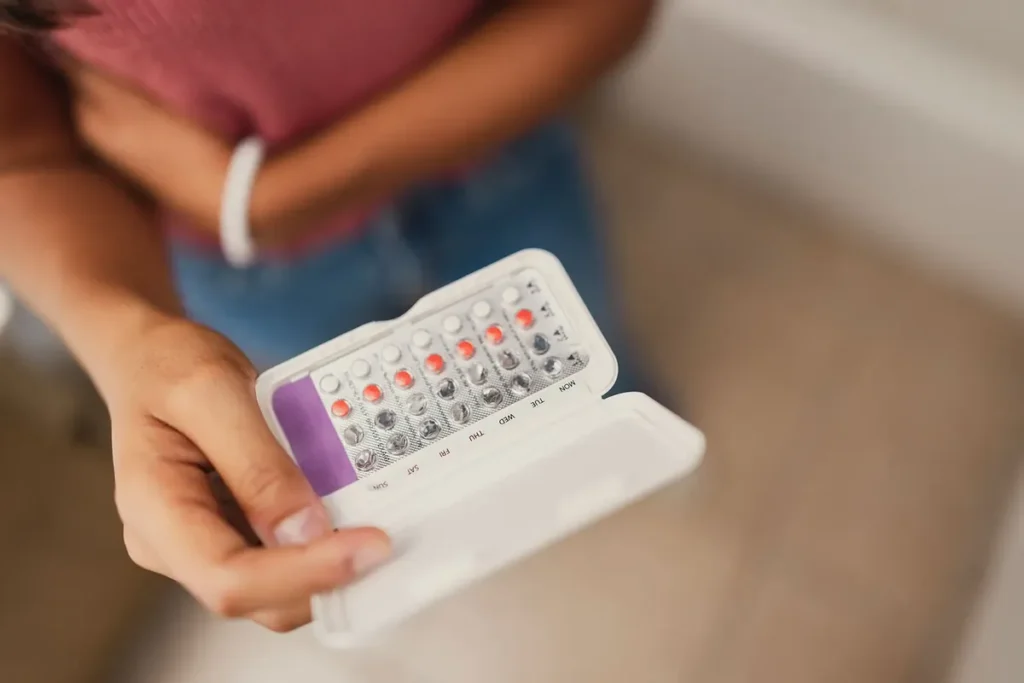Birth control pills are one of the most effective ways to prevent pregnancy when taken correctly. But what happens if you forget to take just one? It’s a common worry—and for good reason. Even missing a single pill can slightly increase your chances of getting pregnant, depending on when and how you miss it.
Recommended: Does Birth Control Pills Cause Weight Gain?
In this blog, we’ll break down what actually happens when you miss a birth control pill, how it affects your body, and what steps you should take to stay protected. Whether it’s your first time missing a dose or just something you’re curious about, this guide will help clear things up.
How Birth Control Pills Work
Birth control pills prevent pregnancy by using hormones to control how your reproductive system functions. There are two main types: combination pills, which contain both estrogen and progestin, and mini-pills, which contain only progestin.

These pills work in a few ways. First, they stop your ovaries from releasing eggs, a process called ovulation. Without an egg, there’s nothing for sperm to fertilize. Second, they make the mucus in your cervix thicker, which makes it harder for sperm to reach any egg that might have been released. Lastly, they thin the lining of the uterus, making it less likely for a fertilized egg to implant and grow.
When taken correctly and consistently, birth control pills are highly effective at preventing pregnancy. However, missing a pill can reduce their effectiveness, especially if you take mini-pills, which require very precise timing.
What Happens If You Miss a Pill?
Missing a birth control pill can slightly lower its effectiveness, depending on how many pills you miss, the type of pill you’re taking, and where you are in your cycle. If you miss just one pill, your hormone levels may dip enough to allow ovulation to happen, which increases the chance of pregnancy, especially if it’s early in your pack or close to your ovulation window.
Recommended: How to Switch from the Pill to an IUD
For combination pills, missing one is usually not a big issue if you take it as soon as you remember and continue the rest of your pills as scheduled. But if you’re on the mini-pill, which contains only progestin, timing is more critical. Even being three hours late can increase your risk of getting pregnant, since these pills have a shorter window of effectiveness.
It’s also important to note that your body might react to a missed pill with spotting, changes in your period, or slight cramping. If you’ve had unprotected sex after missing a pill, it’s a good idea to consider emergency contraception and consult a healthcare provider for guidance.
How Much Does Missing One Pill Increase Your Risk?
Missing just one birth control pill doesn’t usually lead to pregnancy, but it can slightly increase your risk—especially depending on when during your cycle the pill was missed and what type of pill you’re taking. For most people using combination pills, the risk stays low if the missed pill is taken within 24 hours. In this case, your hormone levels typically stay steady enough to still prevent ovulation.
However, if you miss a pill early in your cycle (right after your period), your risk goes up a bit more because your body may be preparing to release an egg. The same goes for mini-pills, which require stricter timing. Missing or even being a few hours late with a mini-pill can reduce its effectiveness more noticeably.
Recommended: When Should I Start My Birth Control Pack?
Overall, the risk from one missed pill is small, but it’s not zero. That’s why it’s always best to take the missed pill as soon as you remember and use backup protection, like condoms, if you’re unsure or have missed more than one pill.
Early Pregnancy Signs While on the Pill
While birth control pills are highly effective when taken correctly, no method is 100% foolproof. That’s why it’s possible—though rare—to get pregnant even while on the pill, especially if you’ve missed one or more doses. If you’re still taking the pill but suspect you might be pregnant, you may notice some early signs.
One of the first signs is a missed period, though this can be tricky since some pills can cause lighter or skipped periods even when you’re not pregnant. Other common early signs include breast tenderness, nausea, fatigue, and mild cramping. You might also notice frequent urination, food aversions, or a heightened sense of smell.
These symptoms can be subtle and easily confused with normal side effects of birth control, which is why many people don’t realize they’re pregnant until later. If you experience any unusual changes in your body, especially after missing pills or taking them irregularly, it’s a good idea to take a pregnancy test or consult your healthcare provider just to be sure.
When Should You Use Backup Contraception?
You should use backup contraception, like condoms, whenever your birth control protection might be reduced—especially after missing pills. For combination pills, if you miss just one pill and take it within 24 hours, you’re generally still protected. But if you miss two or more pills in a row, or start a new pack late, it’s safer to use backup protection for at least 7 days while your hormone levels stabilize.

For mini-pills (progestin-only), the rules are stricter. If you’re more than 3 hours late taking a mini-pill, you should use backup contraception for at least 48 hours. This is because mini-pills have a shorter window of effectiveness and don’t offer as much flexibility as combination pills.
Recommended: What’s the Best Birth Control Method with the Least Side Effects?
You should also use backup protection if you’re dealing with vomiting or severe diarrhea shortly after taking a pill, since this can affect how well your body absorbs it. In any case of doubt, using backup contraception is a smart move to stay protected and reduce the risk of unintended pregnancy.
What to Do If You Miss a Birth Control Pill
Missing a birth control pill happens to the best of us, and what you should do next depends on the type of pill you’re taking and how many you’ve missed.
For combination pills (estrogen + progestin)
- Missed 1 pill:
Take it as soon as you remember, even if that means taking two pills in one day. Continue the rest of your pack as usual, and there’s no need for backup contraception. - Missed 2 or more pills:
Take the most recent missed pill immediately and discard any skipped pills. Continue with the pack as normal and use backup contraception (like condoms) for the next 7 days. If you missed pills during the first week and had unprotected sex, consider emergency contraception.
For mini-pills (progestin-only)
- Late by more than 3 hours:
Take the missed pill right away and continue taking the next pill at the usual time. Use backup contraception for at least 48 hours. If you had unprotected sex, consider emergency contraception.
Tips to Help You Remember Your Pills Daily
Here are some practical tips to help you remember to take your birth control pills every day and stay on track:
1. Set a Daily Alarm or Reminder
Set a daily alarm or notification on your phone to remind you to take your pill at the same time each day. Consistency is key, and having a reminder helps prevent missed doses.
Recommended: Does Birth Control Pills Make You Sleepy?
2. Use a Pill Reminder App
There are many apps specifically designed to help you track your birth control pills. These apps not only remind you to take your pill but also help you track your cycle and provide helpful tips. Some apps even allow you to log missed pills and offer guidance on what to do next.
3. Keep Your Pill Pack in a Visible Place
Place your pill pack somewhere you’ll see it every day—next to your toothbrush, next to your bed, or in your bag. This helps trigger your memory to take it, making it part of your daily routine.
4. Link It to Another Routine Activity
Pair taking your pill with an existing habit, like brushing your teeth or having your morning coffee. Associating pill-taking with something you do daily makes it easier to remember.
5. Use a Pill Organizer

A pill organizer with compartments for each day of the week can help you keep track of whether you’ve taken your pill. Some organizers even have built-in alarms to remind you.
6. Tell a Trusted Friend or Partner
Sometimes, having someone else to remind you can help. You could ask a partner, family member, or friend to give you a gentle nudge when it’s time to take your pill.
Recommended: What Happens If You Take Expired Birth Control Pills?
7. Keep Extra Pills on Hand
In case you forget to take your pill and miss a dose, it’s a good idea to keep an extra pill or pack nearby. This ensures that you can quickly take a missed pill without delaying your schedule.
8. Use a Birth Control Case
If you’re always on the go, carrying a small case with your current pill pack can be a great reminder to take your pill wherever you are. It’s convenient and keeps your pills safe and accessible.
Recommended: Family Planning for Women Over 30
9. Set Multiple Reminders
If one alarm isn’t enough, set several reminders. You could have one in the morning when you wake up and another right before bed to reinforce the habit.
10. Stay Consistent
Taking your pill at the same time each day, whether in the morning or evening, helps build a routine. When you stay consistent, it becomes easier to remember.
Conclusion
Remembering to take your birth control pill every day is essential for maintaining its effectiveness and preventing unintended pregnancy. While missing a pill occasionally can happen, knowing what steps to take and how to build strong daily habits can make all the difference.
By using reminders, organizing your routine, and staying informed, you can stay consistent and in control of your reproductive health. And if you ever feel unsure or miss multiple pills, don’t hesitate to reach out to a healthcare provider—they’re there to support you.
